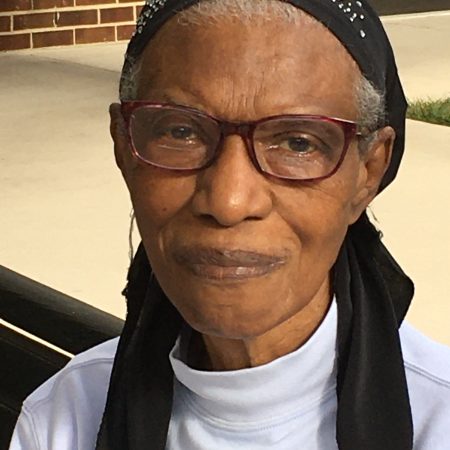“I was born in Eastman, Georgia, a small Southern town south of Atlanta during the latter part of the Great Depression. FDR was President and the primary agenda of his New Deal was to lift the country out of poverty. Jim Crow was the law of the land. I was the eldest of three, and my father was a tenant farmer; our farm provided for most of our needs. A New Deal program made it possible for us to move from a shack to a better home that had running water and a sink but no bathroom – we still had to bathe in the tin tub every Saturday night or as needed! We had the good fortune to have a radio, one of the few families that did, and I remember listening to a children’s show, ‘Let’s Pretend,” and C.L. Franklin, the preacher, and father of Aretha Franklin. I have memories of Pearl Harbor and how our neighbors piled into our home to hear the reports and speculate about what the War would bring.”
“When I was in elementary school, my family moved to Ft. Pierce, Florida when my father got a job with the USO. After the war, we moved to Atlanta. My mother was able to go to beauty school and then build and run a beauty shop off the back porch of our home. In Atlanta, I attended Booker T. Washington High School, the only high school for black children in Atlanta. I was a good student and was encouraged by my teachers to go to college, as well as by my aunt who was also an educator. I went to Clark College, a historically black university, and got a degree in Elementary Education and Library Sciences. After college, I married and had my first child, Cynthia, and then moved to the D.C. area where Kenneth was born. I raised a family and worked throughout the metro area until retiring in 2010.”
Claudine went on to describe how in rural Georgia in the 1930s, there was no state-elementary education for black children, so it was left to the church community to educate them. She described the small country church she grew up in as “old-time religion.” In Atlanta, she went to Beulah Baptist Church. Claudine became more interested in religion when she studied it in college and learned about it from a historical perspective. And of course, religion was a very important part of the Civil Rights Movement. But as her religious beliefs evolved, Claudine became more of a skeptic: “I’m not so sure God’s gonna do what I want him to – maybe, maybe not. I don’t expect miracles. I’m going to do everything I know how to do to reach my goal. I don’t completely wait on God.” She also wryly observed that in her experience, “ministers tended to be little kings and were often into the money.” Claudine started going to All Soul’s Church in D.C. Back then, she said, there were more Blacks at All Soul’s, as well as people from many walks of life, socially, culturally, and economically, something she misses. She found UUCSS when she moved to Montgomery County in 2006.
Claudine has most enjoyed volunteering for the Diversity Committee. Claudine had opportunities to do presentations sharing her experiences. Claudine has also enjoyed working on Hospitality and Sunday Support for which she is so well suited. She lights up many eyes with her delightful smile and beautiful outfits, and it’s hard not to notice how people seek her out for quiet conversations, to be gifted with her intelligence and strength. She is indeed a beloved member of this community and a rare treasure of a person.

